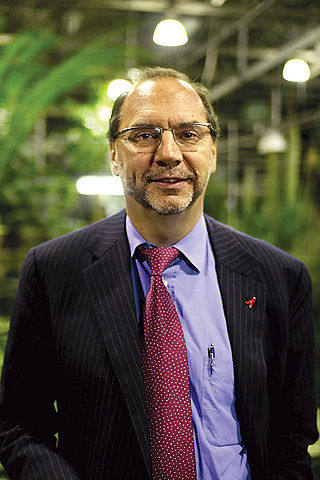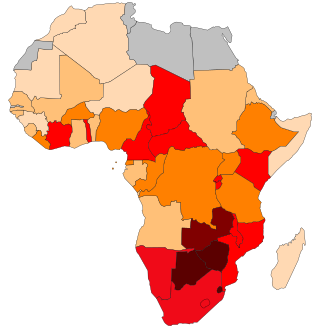
The Joint United Nations Programme on HIV and AIDS is the main advocate for accelerated, comprehensive and coordinated global action on the HIV/AIDS pandemic.

World AIDS Day, designated on 1 December every year since 1988, is an international day dedicated to raising awareness of the AIDS pandemic caused by the spread of HIV infection and mourning those who have died of the disease. The acquired immunodeficiency syndrome (AIDS) is a life-threatening condition caused by the human immunodeficiency virus (HIV). The HIV virus attacks the immune system of the patient and reduces its resistance to other diseases. Government and health officials, non-governmental organizations, and individuals around the world observe the day, often with education on AIDS prevention and control.

Richard Duane Warren is an American Baptist evangelical Christian pastor and author. He is the founder of Saddleback Church, an evangelical Baptist megachurch in Lake Forest, California. Since 2022, he is director of the Finishing the Task mission coalition.

Saddleback Church is an Evangelical Baptist multi-site megachurch based in Lake Forest, California. It is the largest church in California, and one of the largest in the United States of America. The church has several campuses in California and around the world. Weekly church attendance was 30,000 people in 2023. Its senior pastor is Andy Wood and his wife, Stacie Wood, is a teaching pastor.

Sir Peter Karel, Baron Piot, is a Belgian-British microbiologist known for his research into Ebola and AIDS.

The Presidential Advisory Council on HIV/AIDS (PACHA) advises the White House and the Secretary of Health and Human Services on the US government's response to the AIDS epidemic. The commission was formed by President Bill Clinton in 1995 and each president since has renewed the council's charter.

The global pandemic of HIV/AIDS began in 1981, and is an ongoing worldwide public health issue. According to the World Health Organization (WHO), by 2023, HIV/AIDS had killed approximately 40.4 million people, and approximately 39 million people were infected with HIV globally. Of these, 29.8 million people (75%) are receiving antiretroviral treatment. There were about 630,000 deaths from HIV/AIDS in 2022. The 2015 Global Burden of Disease Study estimated that the global incidence of HIV infection peaked in 1997 at 3.3 million per year. Global incidence fell rapidly from 1997 to 2005, to about 2.6 million per year. Incidence of HIV has continued to fall, decreasing by 23% from 2010 to 2020, with progress dominated by decreases in Eastern Africa and Southern Africa. As of 2020, there are approximately 1.5 million new infections of HIV per year globally.
The human immunodeficiency virus (HIV), which causes AIDS, varies in prevalence from nation to nation. Listed here are the prevalence rates among adults in various countries, based on data from various sources, largely the CIA World Factbook.
The P E A C E Plan is a humanitarian development program for churches and an evangelical Christian mission from Saddleback Church in Lake Forest in California in the United States.

The Purpose Driven Church: Growth Without Compromising Your Message & Mission is a 1995 book by Rick Warren, founder and senior pastor of Saddleback Church in Lake Forest, California, United States.
Global Action for Children (GAC) was a highly effective nonpartisan coalition dedicated to improving the lives of orphans and vulnerable children in the developing world active from 2004 - 2010.
Youthforce was an international youth network founded in 1999 to raise visibility around the impact of HIV/AIDS on youth.

HIV and AIDS is a major public health issue in Zimbabwe. The country is reported to hold one of the largest recorded numbers of cases in Sub-Saharan Africa. According to reports, the virus has been present in the country since roughly 40 years ago. However, evidence suggests that the spread of the virus may have occurred earlier. In recent years, the government has agreed to take action and implement treatment target strategies in order to address the prevalence of cases in the epidemic. Notable progress has been made as increasingly more individuals are being made aware of their HIV/AIDS status, receiving treatment, and reporting high rates of viral suppression. As a result of this, country progress reports show that the epidemic is on the decline and is beginning to reach a plateau. International organizations and the national government have connected this impact to the result of increased condom usage in the population, a reduced number of sexual partners, as well as an increased knowledge and support system through successful implementation of treatment strategies by the government. Vulnerable populations disproportionately impacted by HIV/AIDS in Zimbabwe include women and children, sex workers, and the LGBTQ+ population.
Martin Ssempa is a Ugandan charismatic pastor, activist, and the founder of the Makerere Community Church. He referred to himself as Pastor Doctor Martin Ssempa, but now calls himself Gabriel Baaba Gwanga'mujje Eri Yesu. Ssempa first came to international prominence in 2010, after a presentation video he made at his church, which showcased his opposition to homosexuality, went viral.

United Nations Security Council resolution 1308, adopted unanimously on 17 July 2000, was the first resolution to address the impact of HIV/AIDS worldwide. The Security Council asked countries to consider voluntary HIV/AIDS testing and counselling for troops deployed in peacekeeping operations.
Since reports of emergence and spread of the human immunodeficiency virus (HIV) in the United States between the 1970s and 1980s, the HIV/AIDS epidemic has frequently been linked to gay, bisexual, and other men who have sex with men (MSM) by epidemiologists and medical professionals. It was first noticed after doctors discovered clusters of Kaposi's sarcoma and pneumocystis pneumonia in homosexual men in Los Angeles, New York City, and San Francisco in 1981. The first official report on the virus was published by the Center for Disease Control (CDC) on June 5, 1981, and detailed the cases of five young gay men who were hospitalized with serious infections. A month later, The New York Times reported that 41 homosexuals had been diagnosed with Kaposi's sarcoma, and eight had died less than 24 months after the diagnosis was made.
Dr Luiz Loures was the Deputy Executive Director, Joint United Nations Programme on HIV/AIDS (UNAIDS). He was appointed to this position at the level of Assistant Secretary-General of the United Nations by the United Nations Secretary-General Ban Ki-moon on 14 December 2012.

Mary Jane Rotheram-Borus is a licensed clinical psychologist and professor with the University of California, Los Angeles, Department of Psychiatry and Biobehavioral Sciences. Rotheram is the professor-in-residence in the Semel Institute for Neuroscience and Human Behavior. She is the Director of the Global Center for Children and Families at UCLA and the former director of the Center for HIV Identification, Prevention, and Treatment Services.
Dr. Debrework Zewdie, former director of the World Bank Global AIDS Program and Deputy Executive Director and COO of the Global Fund, is an Ethiopian national who has led strategy, policy implementation, and management of development programs at country, regional, and global levels for international bodies such as the World Bank and The Global Fund to Fight AIDS, Tuberculosis and Malaria. As an immunologist, she conceptualized and managed the groundbreaking US$1 billion Multi-country HIV/AIDS Program that changed the AIDS funding landscape and pioneered the large-scale multi-sectorial response with direct financing to civil society and the private sector. Dr. Zewdie led the articulation of the World Bank's first global strategy on HIV/AIDS and the Global HIV/AIDS Program of Action. As a founding UNAIDS Global Coordinator, she has been instrumental in making the unique cooperative structure of the UNAIDS family a working reality, fostering strong inter-agency partnerships. She is an advocate for women's health and was a founding vice president and member of the Society for Women and AIDS in Africa (SWAA). She established institutional rigor at the Global Fund and led its wide-ranging internal reform which culminated in the ongoing corporate transformation program. Dr. Zewdie has a Ph.D. in clinical immunology from the University of London, a postdoctoral fellowship at SYVA Company, and was a Senior MacArthur Fellow at the Harvard Center for Population and Development Studies. Dr. Zewdie was a Richard L. and Ronay A. Menschel Senior Leadership Fellow at the Harvard T.H. Chan School of Public Health in 2015. During her Fellowship at the Harvard Chan School, she also participated as a speaker on Voices in Leadership, an original webcast series, in a discussion titled, "Leadership in Getting AIDS on the World Bank Agenda", moderated by Dr. Barry Bloom.

John N. Nkengasong is a Cameroonian-American virologist serving as the Global AIDS Coordinator in the Biden administration since 2022 and Senior Bureau Official for Global Health Security and Diplomacy since 2023. He previously worked as the Director of the Africa Centres for Disease Control and Prevention from 2016 to 2022, as well as at the World Health Organization (WHO) and Centers for Disease Control and Prevention. During the COVID-19 pandemic, Nkengasong was appointed the WHO Special Envoy for Africa.













